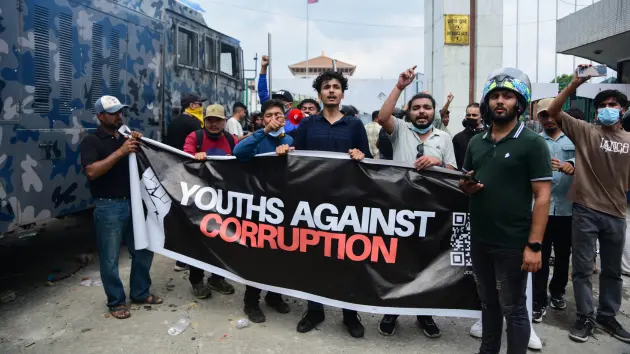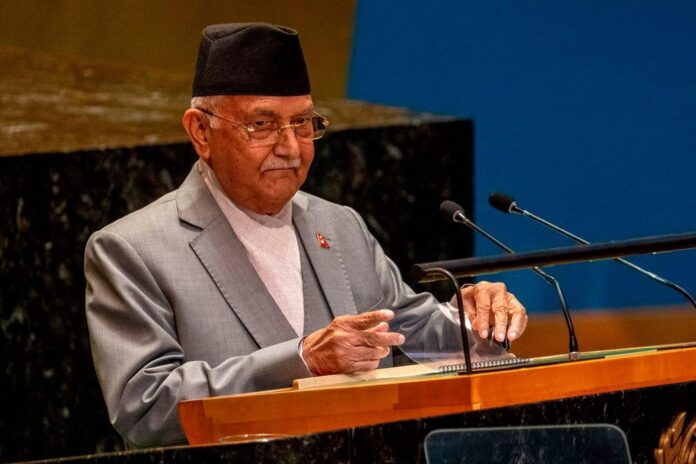Nepal plunged into political turmoil on Tuesday as Prime Minister Khadga Prasad Oli announced his resignation following days of mass protests that spiraled into violent confrontations with security forces. The unrest, triggered by a controversial ban on popular social media platforms, has evolved into a nationwide uprising fueled by anger over corruption, inequality, and police violence that claimed at least 19 lives.
Deadly Crackdown Fuels Public Anger

The protests first erupted after the government abruptly blocked access to major platforms, including Facebook, YouTube, and X, citing failure to comply with registration requirements. Young people, who rely heavily on social media for communication and political expression, spearheaded the demonstrations.
On Monday, tensions escalated dramatically when police opened fire on crowds outside the Parliament building in Kathmandu. At least 19 people were killed and dozens more seriously injured. Doctors at the National Trauma Center reported that many victims had been shot in the head and chest.
The government lifted the ban on Tuesday, but the move came too late to calm public outrage. Instead, anger intensified, with demonstrators accusing the authorities of trying to silence dissent and cover up widespread corruption.
Prime Minister Steps Down
As protests engulfed major cities, Prime Minister Oli announced his resignation. President Ram Chandra Poudel accepted the decision, appointing Oli to head a caretaker government until new leadership is installed.
It remains unclear how much authority Oli will retain in the interim, as his own residence and several government buildings were set ablaze by furious demonstrators. Army helicopters were deployed to evacuate ministers and officials from besieged offices.
Appealing for calm, President Poudel urged protesters to “engage in dialogue rather than destruction.” The Nepal Army also issued a statement calling for restraint and political negotiation.
Widespread Destruction Across Kathmandu
Tuesday saw some of the most violent scenes in Kathmandu’s recent history. Demonstrators stormed the prime minister’s official residence, the presidential palace, and Singha Durbar — the central government complex housing multiple ministries. Several offices of political parties, including the ruling coalition partners, were vandalized and burned.
Thick plumes of smoke rose across the capital as protesters torched government offices. Videos circulating online showed angry crowds beating politicians, including Nepali Congress leader Sher Bahadur Deuba and Foreign Minister Arzu Rana Deuba. Both appeared injured before being evacuated.
Youth Frustration at the Core
While the immediate trigger was the social media ban, analysts say the unrest reflects deep-seated frustrations among Nepal’s youth. With unemployment estimated at 20 percent, and thousands of young people leaving the country daily to seek work abroad, many accuse political elites of ignoring their struggles.
“This is not just about social media,” said student protester Bishnu Thapa Chetri. “We are angry because corruption has stolen our future. Politicians’ children live in luxury, while ordinary youths like us are forced to leave our country to survive.”
Protesters dubbed the demonstrations the “Gen Z Movement,” highlighting a generational divide between the ruling class and younger Nepalis who feel excluded from opportunities.
Opposition Under Fire
The protests targeted not only the prime minister but also opposition leaders, who many believe are equally complicit in corruption. Homes belonging to senior politicians across party lines, including leaders of the Maoist party, were attacked and set on fire.
“We are here because our friends were killed,” said protester Narayan Acharya outside Nepal’s parliament building. “K.P. Oli must be removed, and this entire corrupt system must go.”
Government Promises Inquiry
Before resigning, Oli announced plans to form an investigative committee to examine the police shootings, with findings expected within 15 days. He also promised financial compensation for the families of those killed and pledged free medical care for the wounded.
However, these assurances did little to calm public anger. Protesters insisted that only a full political overhaul could restore trust.
Controversial Social Media Law
At the heart of the crisis is Nepal’s ongoing effort to regulate online platforms. A draft bill currently under consideration would require global companies to establish offices in Nepal and accept government oversight. Critics argue the law is a veiled attempt to impose censorship and stifle criticism of those in power.
Rights groups have condemned the proposal as an attack on freedom of speech. Technology companies, including Google and Meta, have so far declined to comment publicly. TikTok, Viber, and a handful of other platforms registered under the rules, while larger firms resisted.
Nepal has previously struggled with regulating online content. In 2023, TikTok was temporarily banned for allegedly spreading “indecent material,” only to be reinstated after the company pledged compliance with local laws.
What Comes Next?
Despite the prime minister’s resignation, protests show no sign of abating. Demonstrators remain on the streets, demanding accountability for the killings and sweeping reforms to end corruption. With government buildings in ruins and trust in political leaders at historic lows, Nepal faces one of its gravest political crises in decades.
For now, the caretaker government led by Oli will attempt to maintain order. But many fear the Himalayan nation, squeezed between regional giants India and China, could be entering a prolonged period of instability unless a credible new leadership emerges.
Sources: NDTV


